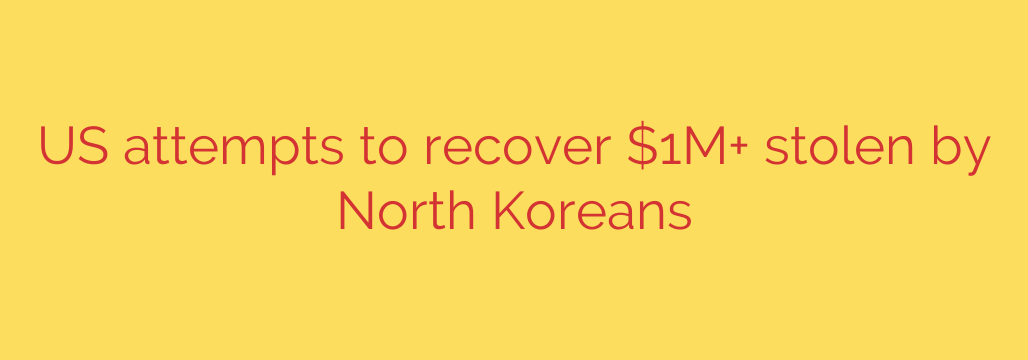
US Seizes Over $1 Million in Crypto from North Korean Ransomware Hackers
In a significant blow to state-sponsored cybercrime, U.S. authorities have successfully seized and recovered over $1 million in cryptocurrency payments made to North Korean hackers. The funds were ransoms paid by multiple American organizations, including healthcare facilities, whose systems were crippled by a sophisticated ransomware variant.
This operation highlights a critical and growing threat: the use of cybercrime by North Korea to fund its illicit weapons programs and evade international sanctions.
A Coordinated Attack on Critical Infrastructure
The attacks were carried out by state-sponsored actors using a ransomware strain known as “Maui.” This particular malware was used to target the healthcare and public health sectors across the United States. In one instance, a Kansas-based hospital was attacked in 2021, rendering their servers and electronic health records inaccessible. Unable to operate, the hospital paid a ransom of approximately $100,000 in Bitcoin to regain access to their critical systems.
Shortly after, a medical provider in Colorado was also hit by the Maui ransomware. The swift response and cooperation between the victims and the FBI were crucial in the subsequent investigation. By reporting the incident quickly, the organizations enabled law enforcement to begin tracking the illicit funds almost immediately.
Following the Digital Breadcrumbs: The FBI’s Crypto Trace
After the ransom payments were made, the FBI launched a meticulous investigation to follow the money. Cybercriminals often believe cryptocurrencies like Bitcoin provide complete anonymity, but with advanced tracing tools, law enforcement can follow transactions on the public blockchain.
The investigation revealed that the North Korean hackers, with the help of Chinese money launderers, attempted to obscure the source of the funds by moving them through a complex series of digital wallets and exchanges. However, investigators successfully traced the digital “breadcrumbs” and identified the funds, leading to the seizure of crypto accounts holding the stolen ransom payments.
This recovery demonstrates a key principle: cooperation between private sector victims and law enforcement is essential to combating cybercrime. By reporting attacks and sharing information about payment details, organizations can help authorities disrupt these criminal networks and claw back stolen assets.
More Than Just Money: Funding a Rogue State
U.S. officials have made it clear that these ransomware campaigns are not isolated criminal acts. They are part of a state-directed strategy by the Democratic People’s Republic of Korea (DPRK) to generate revenue for its weapons of mass destruction (WMD) and ballistic missile programs. By extorting money from hospitals and other critical infrastructure, North Korea directly finances activities that threaten global security.
This seizure sends a powerful message to hostile nations and cybercriminal groups: the United States will actively pursue and recover illicit funds, no matter how sophisticated the laundering techniques.
How to Protect Your Organization From Ransomware Attacks
While this recovery is a significant victory, it underscores the persistent threat of ransomware. Businesses, healthcare providers, and public institutions must remain vigilant. Here are essential security measures to implement:
- Maintain Offline Backups: Regularly back up your critical data to an offline, encrypted location. This ensures you can restore your systems without paying a ransom.
- Patch Promptly: Keep all software, operating systems, and applications updated with the latest security patches to close known vulnerabilities.
- Implement Multi-Factor Authentication (MFA): Secure all accounts, especially for remote access and administrative privileges, with MFA to prevent unauthorized access.
- Develop an Incident Response Plan: Know exactly what to do when an attack occurs. Your plan should include isolating affected systems, contacting law enforcement, and communicating with stakeholders.
- Report Incidents Immediately: If you are the victim of a ransomware attack, contact your local FBI field office or the Internet Crime Complaint Center (IC3) immediately. As this case shows, quick reporting can lead to the recovery of funds.
Ultimately, officials advise against paying ransoms. Paying encourages further attacks, funds criminal enterprises, and offers no guarantee that your data will be restored. By investing in proactive security and cooperating with authorities, organizations can better defend themselves against these damaging intrusions.
Source: https://go.theregister.com/feed/www.theregister.com/2025/08/11/us_tries_to_recover_1m/








